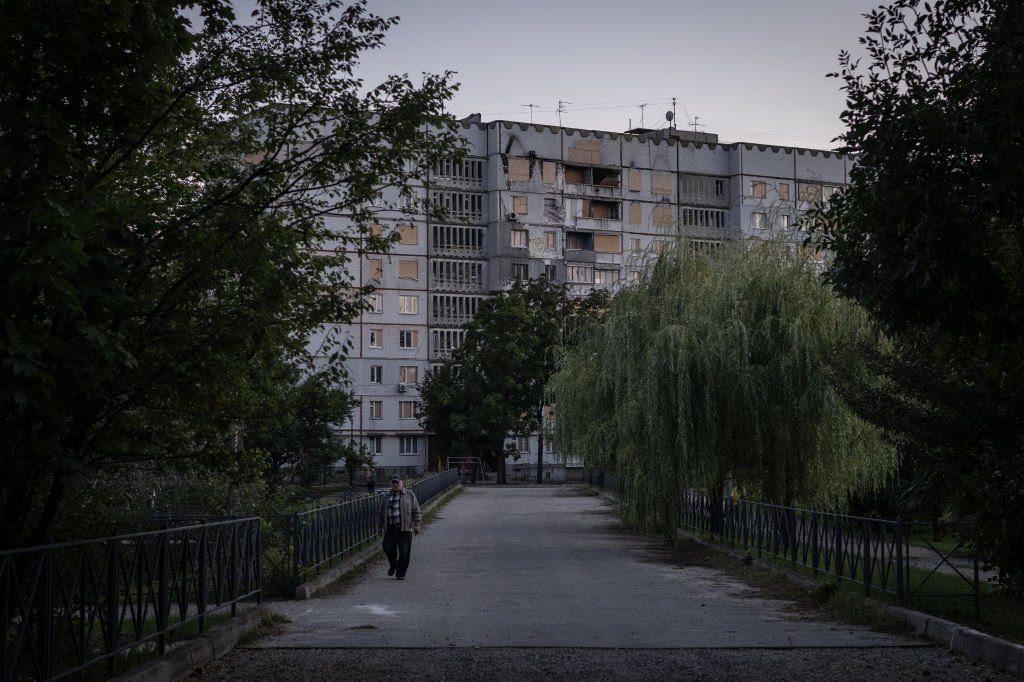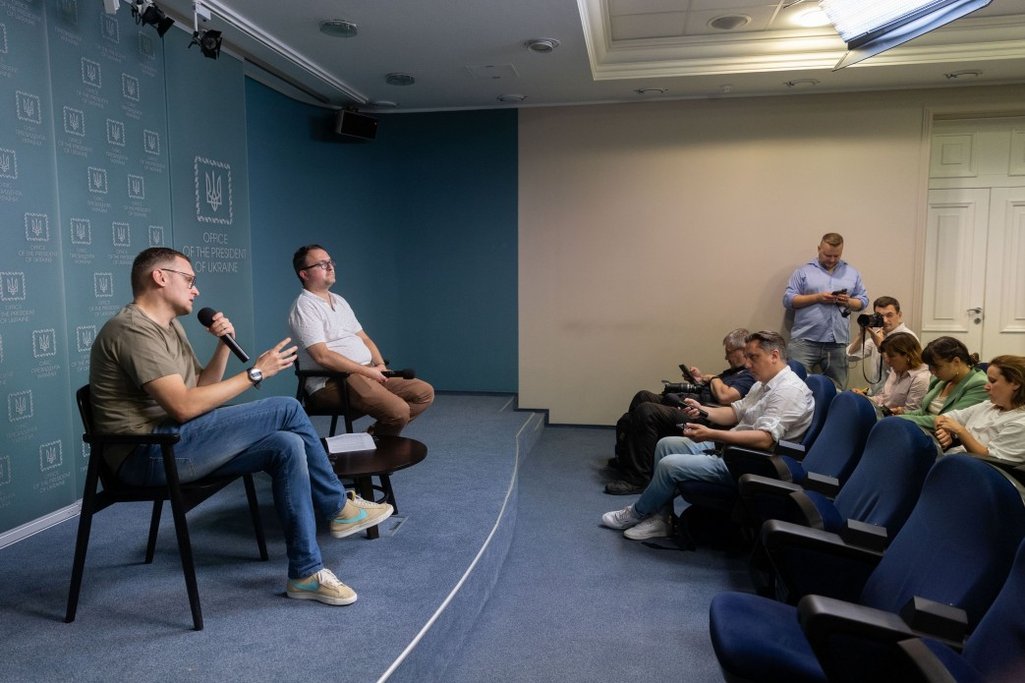When the time comes, how exactly will Russia face justice for its invasion of Ukraine and the tens of thousands of war crimes it is accused of?
For now, Russia’s war shows no sign of ending. But the question of holding Russia to account in the aftermath is already proving a source of tension between Ukraine and its international allies, Ukrainian officials and experts have told openDemocracy.
Different options for tribunals on the crime of aggression (that is, the invasion itself) and Russian war crimes have been touted so far. The final decision on the format will be the result of complex negotiations by Ukraine at the international level.
So far, scenarios include courts created under the International Criminal Court (ICC) or the United Nations. And then there is the prospect of a so-called ‘hybrid’ format: a court with jurisdiction in Ukraine, another country and internationally, as well as a joint Ukrainian and international staff.
In Ukraine’s case, a special tribunal could also be set up – a court recognised by the UN that would be dedicated to the Russian invasion.
But though that’s the Ukrainian government’s preferred option, 18 months of diplomatic work have yet to show results – likely because it could set a precedent for other states that violate the principle of territorial integrity. Not all of Ukraine’s allies want that – certainly not the US, which has its own record of crimes of aggression.
“The doctrine of international law is held hostage by global politics and geopolitics,” said Andriy Smyrnov, deputy head of the Office of the President of Ukraine, at the end of August.
“Some of our partners fear that the precedent [of a special tribunal] will be used against them, because they are also conducting military campaigns abroad. And we must speak honestly about it.”
Volodymyr Zelenskyi has said he is firmly against a hybrid tribunal. As a ‘lesser’ version of an international institution, he fears a ‘hybrid’ tribunal – staffed by Ukrainian judges – will lack the necessary international legitimacy to prosecute Russian president Vladimir Putin. Ukraine’s principal backer, the US, sees it differently: America supports exactly that format.
Each tribunal format has its own potential pitfalls, from failing to establish legitimacy to prosecute international war crimes, to failing to overcome existing principles of personal immunity for higher ranking officials.
At the same time, the sheer number of Russian crimes allegedly committed in Ukraine, and imperfections in war crimes legislation both in Ukraine and internationally, means that the Ukrainian government’s desire for a “special tribunal” for the sole crime of aggression may not be the best solution.
Close the gap
Ukraine’s goal of establishing a new international institution that would prosecute only one crime – the crime of aggression – aims to close the “gap” in the international justice system over precisely that crime.
That’s the claim of Anton Korynevych, an ambassador-at-large for Ukraine’s foreign ministry, who is currently working up options for this so-called special tribunal.
The Russian invasion of Ukraine has been accompanied by thousands of attacks on civilian locations | (c) Ozge Elif Kizil/Anadolu Agency via Getty Image. All rights reserved
No supranational court has full jurisdiction to prosecute countries for violating territorial integrity, he says – not even the ICC, which was not originally set up to prosecute the crime of aggression. By contrast, the other three major international war crimes (war crimes, genocide and crimes against humanity) are prosecuted by the ICC and the Ukrainian national justice system already.
But the ambitious goal of creating an international institution to penalise the crime of aggression might prove unattainable, given the dependency of international law on the contingencies of “global politics”, as Smyrnov claims.
UN countries might not be ready to set up a tribunal that can prosecute any state for an act of invasion, just as many countries still have yet to ratify the Rome Statute, which set up the ICC in the first place.
What is the crime of aggression?
For the ICC to prosecute Russia for the crime of aggression, Russia would have to have ratified the “Kampala Amendments”. Those changes to the Rome Statute, passed in 2010, determine the type of jurisdiction the ICC has over states that have ratified the Rome Statute when it comes to the crime of aggression.
At the same time, Ukraine has partially recognised the jurisdiction of the ICC on crimes against humanity, genocide and war crimes. But it has not actually ratified the Rome Statute, including the Kampala Amendments.
If Ukraine refuses to ratify the Rome Statute, a ‘special’ tribunal on the crime of aggression could be the only body with jurisdiction to override the principle of ‘personal immunity’ in international law, which usually protects high-ranking officials from international prosecutions.
Reluctant support
Beyond the tricky interplay of international law and institutions, there are practical considerations when it comes to prosecuting Russia’s crimes, says Sharon Weill, associate professor of international law at the American University of Paris.
When the ICC issued an arrest warrant for Russian president Vladimir Putin in March this year, the court sought Putin over accusations that he was responsible for the illegal deportation of Ukrainian children.
This warrant, for Weill, means “there is absolutely no logic” for another institution – in parallel to the ICC – to be set up to prosecute Putin, and then issue a second arrest warrant for the Russian president: “It’s just a lot of money, effort and [questionable] legitimacy.”
July 2023: Andriy Smirnov and Anton Koryneyvch hold a briefing on what Ukraine wants from an international tribunal | Image: Office of the President of Ukraine
There is a general impression that Ukraine has been struggling to enlist the support of the international community, especially the US, for the creation of a new international tribunal, a project that started immediately in the aftermath of the full scale-invasion a year and half ago.
That said, Korynevych, who leads Ukraine’s diplomacy for a special tribunal abroad, told openDemocracy that Ukraine has had “good interim results”.
Korynevych pointed out that a new (non-legal) body, the International Centre for the Prosecution of the Crime of Aggression Against Ukraine (ICPA) to support national investigations into the crime of aggression, was set up in The Hague, Netherlands, in July. The ICPA is supposed to help national and international prosecutors work together and share evidence and strategy, but is not a tribunal in itself.
Where have hybrid tribunals been used before?
But Ukraine’s Western partners seem reluctant to go further and support a special tribunal on Russia’s crime of aggression, because it could set a precedent for other states. If a newly established international court prosecutes the crime of aggression, any state could, in theory, be brought to justice for violating another country’s territorial integrity.
The international community may also see Ukrainian authorities as lacking the budget, capacity and impartiality to prosecute Russia single-handedly, Weill added.
Hybrid benefits
A ‘hybrid’ tribunal might have benefits for Ukraine on practical grounds, helping fill legal and logistical gaps in Ukrainian legislation and the country’s justice system.
Immediately after Russia’s full-scale invasion, and after Ukraine’s law enforcement system began to document and investigate Russian crimes in the liberated Kyiv and Chernihiv regions, it became clear that Ukraine’s national legislation was “not harmonised either with international humanitarian law or with other norms related to the investigation of the most serious international crimes,” said Arie Mora, analyst at the Ukrainian Legal Advisory Group, a consulting team.
This means it is “difficult” to “apply the norms of international humanitarian law” when investigating and prosecuting Russian war crimes in Ukraine, Mora continued. “Because of this, the quality of [war crimes prosecutions] suffers greatly.”
For example, there are concerns over how Ukraine’s criminal charge of “violating the laws and customs of war” does not clearly define war crimes, which has resulted in them being miscategorised. And until recently, Ukrainian legislation has had time limits for investigations into serious crimes – meaning potential war crimes such as murder, abduction or torture go uninvestigated.
At the same time, there’s another problem: Ukraine’s national law enforcement and judicial system simply cannot cope with the number of crimes committed by Russia. And the ICC, with its “limited jurisdiction and mandates”, prosecutes only cases that involve high-ranking defendants, said Mora.
The office of Ukraine’s prosecutor general is being offered support by the UK, US and EU to collect evidence and prosecute lower-level Russian war crimes in Ukraine. But that still leaves a gap in the middle.
“A layer of crimes with regard to middle-level and indirect executors – commanders, chiefs and so on who gave orders – remains,” says Mora.
“It will be more difficult to cope with [these crimes] at the national level, which are [also] unlikely to be prosecuted by the ICC,” he said.
The optimal solution, in Mora’s opinion, would be a hybrid tribunal that could resolve all these problems – removing the strain of prosecuting thousands of war crimes from Ukraine’s legal system while assuring effective justice and alignment with international law.
Under a ‘hybrid tribunal’, both sides could be prosecuted for war crimes in a particular conflict. Therefore, Weill told openDemocracy, Ukraine too could find itself in the dock.
This post was originally published on this site be sure to check out more of their content.






